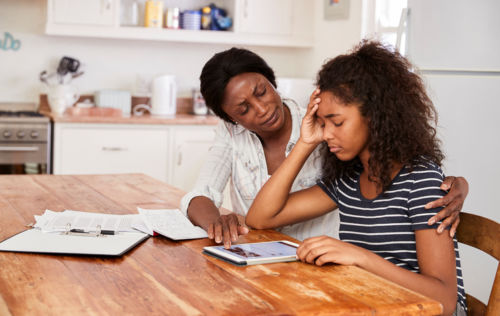Ways to Protect Your Children During Divorce

Divorce is stressful for everyone involved, but sometimes it can be especially hard for children. The children of divorcing parents can often feel uncertain about their futures, or stuck in the middle of two warring sides. Find out how to protect your children from emotional harm during divorce.
In this blog post, I will discuss the emotional effects of divorce on children.
I will explain how the collaborative process can minimize these effects and protect your children from the stress of prolonged litigation.
Divorce Is a Major Life Change, For You and Your Children
There is no easy way to end a marriage, or dissolve a family unit. You, your spouse, and your children have spent years together, building memories, and defining yourselves as a family. Divorce or separation means that everyone involved must redefine what "family" means. That can be difficult, especially since children generally play no part in the reasons for the divorce, but still suffer the consequences of the change.
Depending on your circumstances, divorce can also mean children are forced to move, which means even more life changes. A move during a divorce could cause your children to leave behind their home, their school, and their friends. All of those life changes can be traumatic, especially when taken together with the stress between parents as they work through the divorce.
Identifying Your Child's Stress During Divorce
Divorce can affect your children differently depending on their ages.
- Young children often don't understand why their parents are separating or why they must travel between homes. They may worry that if you stopped loving their parent, you may stop loving them too.
- Grade school children may blame themselves for the divorce, assuming they did something wrong to push their parents apart. They may try to "fix" the situation.
- Adolescents often become angry about the divorce and its changes. They may blame one or both parents, or resent them because of the changes the divorce is causing for them.
These are generalizations, of course. Your child could respond to your divorce differently. In some very high conflict marriages, a child may even see the divorce as a relief; at least now the fighting will stop.
Your child may not know to tell you he or she is feeling stressed during a divorce. However, there are signs that may let you know your child needs a little extra help coping during the transition:
- Sudden temper tantrums
- Behavior problems at school or at home
- Academic trouble
- Anger
- Aggressive behavior
- Detachment from parents or friends
- Defiance
- Crying spells
- Tattling
- Regressive behaviors (including bedwetting)
- Stomach aches
- Headaches
- Sleeping problems
- Substance or alcohol abuse or experimentation
- Sexual acting out
When you see these signs, they are a good indication that you and your former spouse need to take some extra care to protect your children during the divorce process.
Protect Your Children From the Divorce Proceedings
While some of the stresses that go with divorce cannot be avoided, there are certain things you can do to protect your children from the divorce proceedings.
Respect Your Child's Relationship with Each Parent
Whatever issues you may have with your ex-spouse, your children should never be forced to choose between their parents. You should always respect your child's relationship with their other parent, even when you cannot personally see the value of it. Unless your former spouse is unfit to serve as a parent, or putting the child in danger, you should do what you can to encourage the child's connection, especially if the other parent will not have significant custodial time. In practical terms this means:
- Making the child available for all scheduled visitation.
- Being flexible to offer additional or make-up parenting time when scheduling conflicts arise.
- Accommodate when the child wants to spend time with the other parent.
- Allow the child to contact the other parent whenever he or she wants, even during your parenting time.
Don't Put Your Child in the Middle of Your Conflict
Modern methods of communication mean you never need to put your child in the middle of your conflict. Your children should not be responsible for passing messages, even about their own needs. Family law attorneys have helped divorcing couples find better ways to communicate for decades. Instead of using your child to relay messages you could:
- Create a shared online calendar for doctors appointments and school events
- Use a notebook that travels in the child's backpack to record dietary patterns, health issues, or behavioral challenges
- Email or text one another about parenting time exchanges or adjustments
- Use a formal co-parenting software to facilitate communication
Don't ever use your child to spy on your former spouse or pepper them with questions about the other household. Instead, let your children come to you if they have concerns about where they are staying or who is around. If your ex-spouse's new partner is a problem, your children will likely tell you in their own way without prompting.
Give Your Children a Little Extra Love During Hard Times
Kids, especially younger children, need to know that you are there for them during the stressful time of divorce. Schedule play dates with them, do something fun together, or even just make yourself available if they need a hug or to talk about what is happening. Make sure you explain the divorce in an age-appropriate way, without blaming either parent, or especially the child. If your teens are distancing themselves from you, let them know that you are there and willing to provide support, even if they don't take you up on it.
Choose a Divorce Strategy that Teaches Co-Parenting
Another way you can protect your children from the stress of divorce is by choosing a divorce strategy that minimizes that stress. Traditional divorce is "adversarial". It pits parent against parent as they try to convince the court what will be best for their children and their property. Family law litigation can often drag on, even after the divorce is final, as parents continue to fight over problems and changes that arise.
Collaborative divorce is a non-adversarial option that focuses on each family member's needs and priorities. It includes mental health professionals and coaches whose job it is to teach parents strategies to co-parent successfully. The collaborative process acknowledges the loss and stress in every divorce, and helps both parents and children cope with the changes. It also trains parents to resolve future conflicts on their own, without resorting to litigation. By choosing a non-adversarial divorce process, you will minimize the stress related to the process, making it easier for you, and your children, to adjust to life after marriage.
Give Your Children Healthy Ways to Respond to Divorce Stress
It's not enough to acknowledge when stress is affecting your children because of your divorce. You need to help them find healthy ways to respond when stress happens. Kids and parents alike can benefit from learning healthy coping strategies, stress relievers, and relaxation techniques including:
- Exercise
- Bubble baths
- Spending time with friends
- Positive experiences
- Meditation
- Yoga (there are special classes for kids)
Another good strategy is to connect your children with an independent and qualified adult who can help them through the transition. A child therapist or psychologist can give your children someone they trust and can talk to who isn't tied up in the divorce process or have their own expectations about what should happen moving forward. A therapist can also teach your child coping strategies you may not have thought of, and help them adjust to the changes that come with divorce.
Kimberly Miller is a Licensed Associate Marriage and Family Therapist and collaborative law practitioner. She can use these techniques to help you and your spouse resolve your marriage with dignity and protect your children during divorce. If you would like to learn more about the collaborative process, please contact Kimberly.





